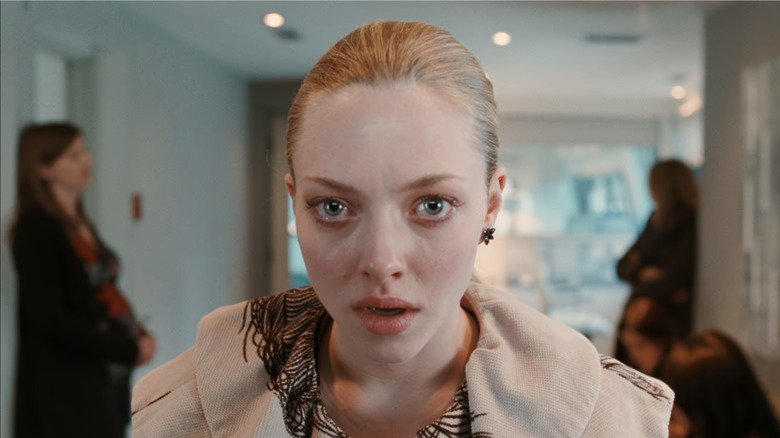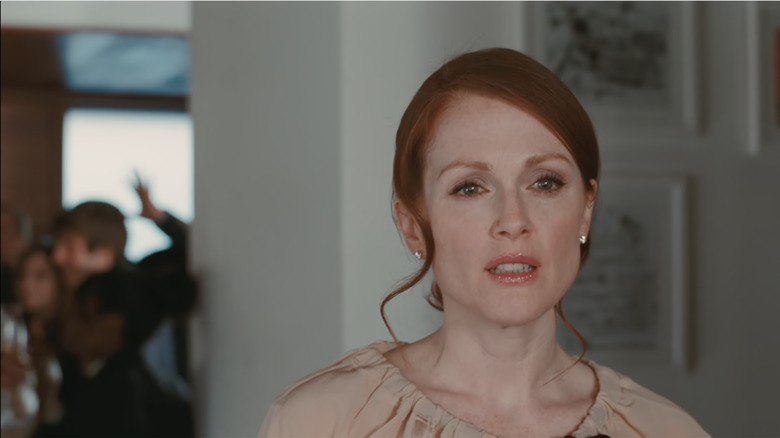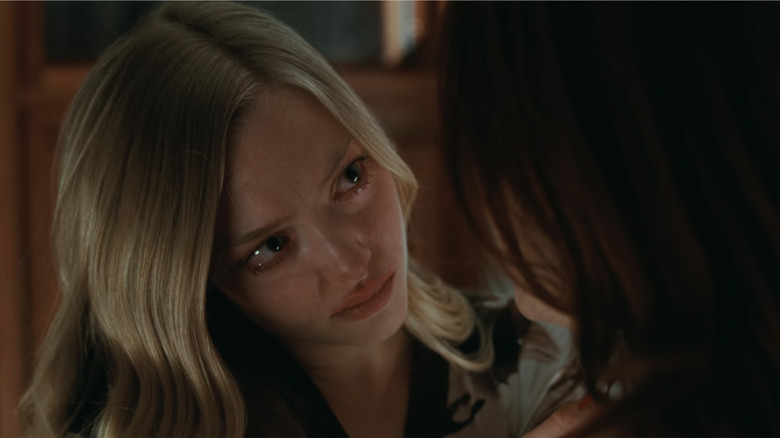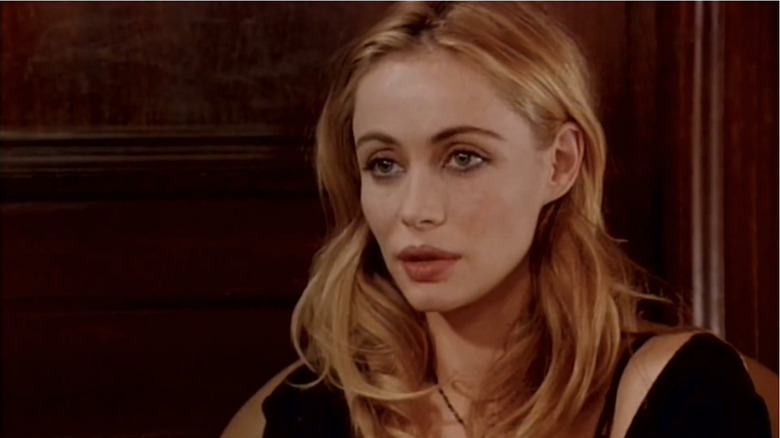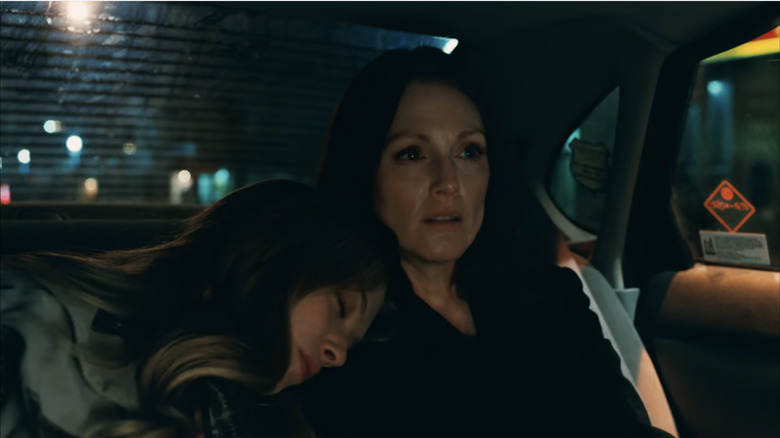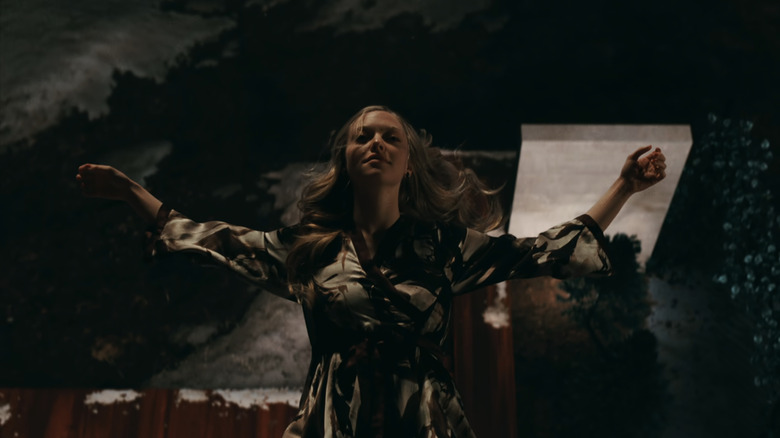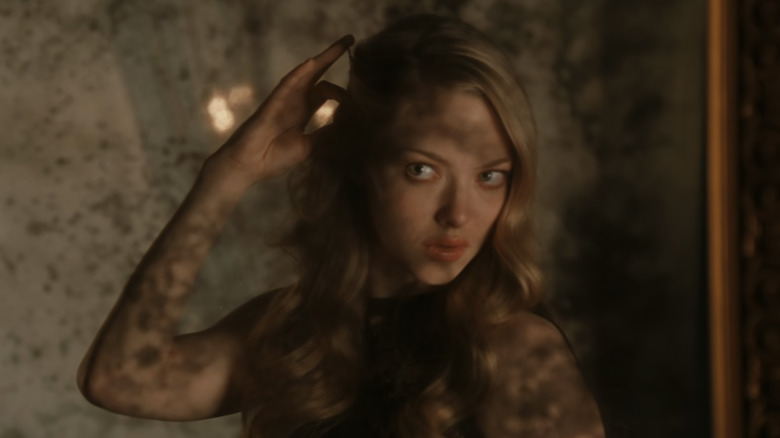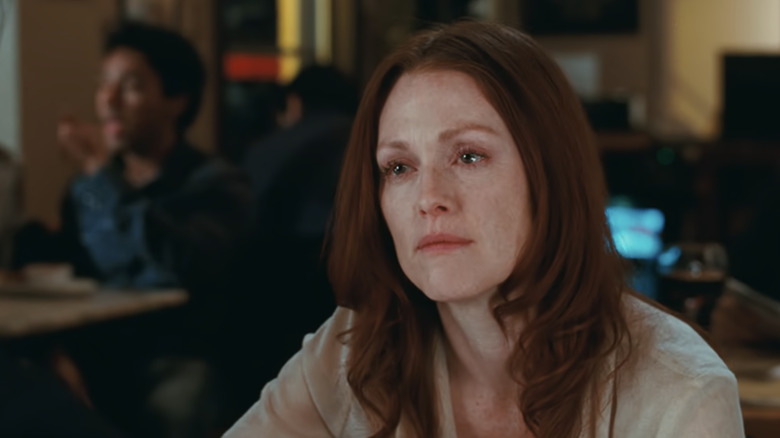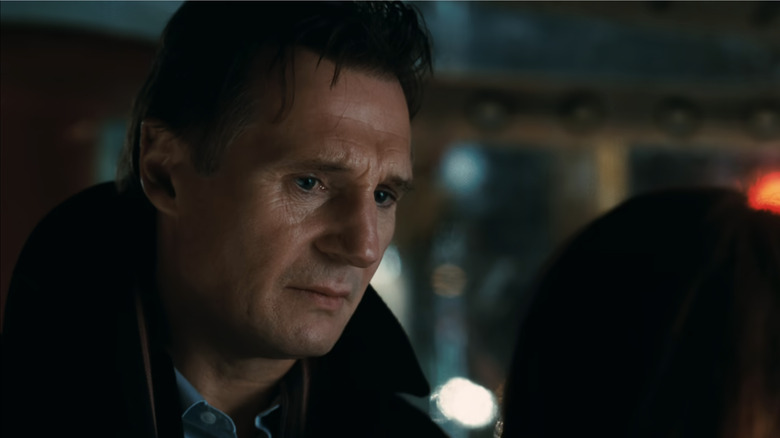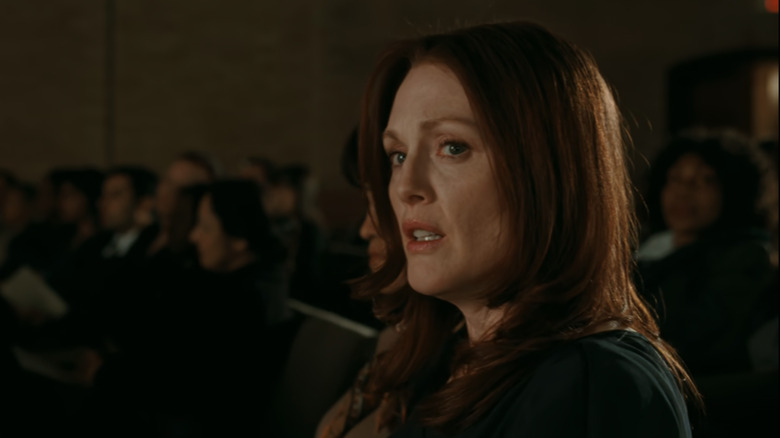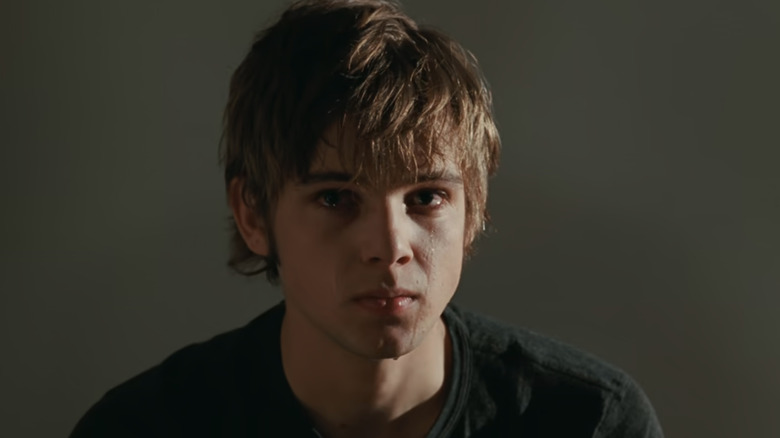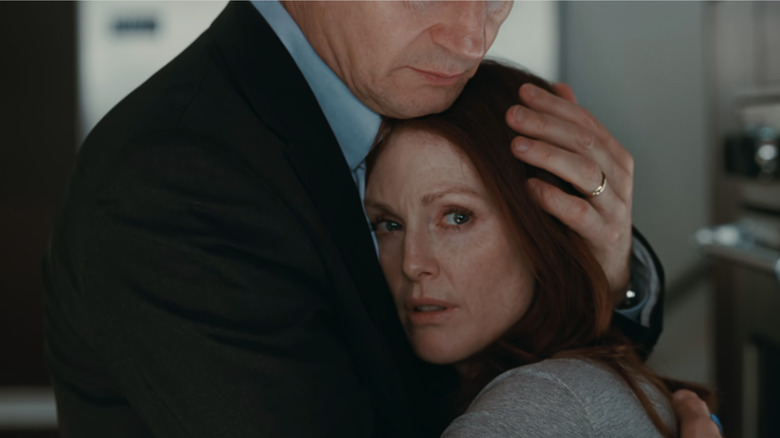The Ending Of Chloe Explained
In 1994, Canadian filmmaker Atom Egoyan exploded onto the international indie scene with "Exotica," a meditation on sex, money, and loneliness that takes place among the workers and patrons of a high-end Toronto strip club. 15 years later the director revisited that same world, but from a different angle, in the erotic thriller "Chloe." Here, the eponymous sex worker (Amanda Seyfried) works out of a fancy hotel lobby instead of a smoky club, and her clientele is not a roomful of wealthy yet pathetic men, but one man at a time — or in this case, one woman. Catherine (Julianne Moore) is a middle-aged doctor who feels invisible to the men in her life, husband David (Liam Neeson) and teenage son Max (Max Thieriot). But her desire to be seen, to be felt, to be loved again comes at a higher price than she could have imagined.
The mysteries of "Chloe" are less about the twists and turns of the plot and more about the way love and intimacy become detached from one another, either from one shocking incident or through the slow march of time. Or as David puts it late in the film, "When did we stop picking each other up from the airport?" That being said, there are several unanswered questions posed by the film's sudden veer into "Fatal Attraction" territory, and an epilogue that finds a young woman dead and a family not only undisturbed by her fate, but seemingly better off for it. Let's take a look at the end of "Chloe."
What you need to remember about the plot of Chloe
Catherine Stewart is a successful Toronto gynecologist, with a downtown office and an austere, ultramodern home in the suburbs. She begins the film as cold and closed off as her surroundings; when talking to a patient who has never had an orgasm, she downplays the experience as nothing more than a muscle contraction. Her husband David, on the other hand, is the opposite: A tall, handsome older man, a beloved university professor, and an inveterate flirt. When Catherine finds a compromising photo on his phone after a business trip to New York, she suspects that he is cheating. But rather than confront him with her suspicions, Catherine decides to catch David in the act by hiring Chloe, the escort who works the luxury hotel next door to Catherine's office, to seduce David and report back.
Chloe does her job, and then some. Her stories of sex with David leave Catherine both aghast and compelled, and try as she might, she's unable to stop herself from using the young woman as a kind of sexual surrogate. At the reception after Max's piano recital, the sight of David's hand on a waitress' arm sends Catherine into a panic. She finds Chloe (in the middle of a date with a client) and forces her up to her hotel room. Desperate to know what her husband feels like to another woman, Catherine sleeps with Chloe.
What happens at the end of Chloe
After their night of passion, Chloe becomes obsessed with Catherine, showing up at her office and flirting with Max. To make matters worse, David now suspects her of having an affair. Racked with guilt, Catherine calls a meeting for the three of them to clear the air, but when Chloe arrives, it's clear to her that David and the young woman have never actually met. The erotic stories Chloe told of their trysts in the park were just that: stories. Chloe quickly runs away, but the meeting gives Catherine and David a chance to reconnect, finally, both physically and emotionally.
David returns to work and Catherine goes home by herself, but she is not alone. While she and David were reconciling, Chloe went to their house and had sex with Max. Catherine finds the two of them asleep in the upstairs bedroom. Shocked and appalled, she confronts Chloe, who attacks her with the sharp silver hairpin that was the subject of their first conversation. In the struggle, one of the home's massive windows pops out. Chloe clings to the window frame and then falls to her death on the broken glass below. Months later, the Stewarts host a graduation party at home for Max and his friends. The family is still together, still a pillar of their community. Catherine smiles at her boys, but when she turns around, we see that she is wearing Chloe's hairpin.
Before Chloe, there was Nathalie...
"Chloe" was the first of Egoyan's feature films that he did not write or co-write himself. The script was by Erin Cressida Wilson, who had proven her erotic drama bona fides with 2002's "Secretary," but the inspiration for the film came from two different sources: Anne Fontaine's 2003 French drama "Nathalie..." which gives "Chloe" its initial premise, and producer Ivan Reitman ("Ghostbusters"), who felt that the film could be remade for North American audiences as a thriller. "Nathalie..." stars French film legends Fanny Ardant and Gerard Dépardieu as distrustful wife Catherine and unfaithful husband Bernard, respectively, and Emmanuelle Béart ("Mission: Impossible") as the sex worker Catherine solicits for erotic detective work.
While the two films share a concept and pivot on the same third-act twist that their stories of infidelity are fictional, "Nathalie..." and "Chloe" are very different viewing experiences. The original film is a much more grounded drama, without the turn toward obsession and violence that marks Egoyan's version. Ardant's Catherine and Nathalie become entwined in each other's lives, but the homoeroticism that is central to the relationship between Moore's Catherine and Chloe is little more than subtext. Depardieu's Bernard, though he never sleeps with Nathalie, is in fact an adulterer, as opposed to Neeson's David. Most notably, no one dies at the end of "Nathalie..." Instead, Béart's sex worker simply confesses her deception to Catherine and leaves the unhappy couple to themselves.
Doubles and Dynamics
Even before Catherine ends the film wearing the telltale hairpin, the film plays with the ways that Catherine sees not just Chloe, but every female character in the film as a reflection of herself — often an unflattering one. There are her patients, starting their journey into motherhood just as she is finishing hers; or the patient who has never had an orgasm, a dancer whose professional discipline has come at the cost of her most basic pleasure. There is the red-haired waitress at the restaurant who David flirts with, the spitting image of a young Catherine. There are Catherine's boozy middle-aged girlfriends who see the Stewarts as the perfect family, and Max's young girlfriend Anna (Nina Dobrev), whose existence Catherine regards with shock, anger, and perhaps a little jealousy.
At that dinner, while David flirts with the red-haired waitress, Catherine's colleague (R.H. Thomson) teasingly points out the number of tables around them filled with wealthy older men and young women whose attention has obviously been paid for. Catherine is scandalized, but the image of older men with younger women haunts the film afterward. Egoyan fills the background with couples in that same dynamic. It's a visual reference to Catherine's own fears about David — an older man constantly in the company of women decades his junior — as well as a foreshadowing of her own relationship with Chloe. In the end, Catherine is not much different than those men at the restaurant, a wealthy older person using an adoring young woman for sex.
Was Chloe's death an accident?
As they grapple at the film's climax, with the hairpin drawing blood from Catherine's neck, Chloe kisses her. Catherine sees Max looking on through the reflection in the bedroom window and pushes Chloe away. The force of the impact knocks the window out of its frame. Chloe grabs the frame, but after a moment her fingers slip and she falls to the ground. Catherine's panic at the moment lets us know that this is no murder. She didn't intend to kill Chloe with her shove, but Chloe's mindset is more mysterious. There is no way she could have predicted or engineered this outcome, but the question remains, was her fall from the window an accident, or did she intentionally let go?
The film's alternate endings answer this question more definitively, but in the theatrical cut, the moment is ambiguous. The way Egoyan presents Chloe's fall, in slow motion with a serene expression on Seyfried's face, certainly suggests that her death is an intentional choice — a final maneuver to stay in Catherine's life forever. But there are other details, like the way her hand grips the window frame before it slips away, or the fact that a fall from a second-story window (even onto broken glass) wouldn't necessarily be fatal, that read as accidental. Whether it was intentional or a terrible twist of fate, however, the result for the characters remains the same.
Does Chloe exist at all?
There is a dreamlike quality to both "Chloe" and Chloe herself. First glimpsed by Catherine from afar, Chloe enters the older woman's life exactly when needed, and in her own way, leaves just as conveniently. Given the fact that her sexual encounters with David were imaginary, it's not that much of a leap for audiences to wonder if Chloe herself isn't somehow imaginary as well, the erotic daydream of a wife who is dismayed that middle age hasn't increased her desirability (in her mind, at least) the way it has her husband's. Even the plot's dark turns can be read as Catherine working through her own guilty feelings over accusing her husband of cheating, and her concerns about her son being sexually active in their house.
Granted, there is little on-screen to support the idea that Chloe is a Tyler Durden-esque manifestation of Catherine's sexually repressed subconscious. What we see is by all accounts actually happening in the story. But the idea of an imaginary Chloe goes a long way toward explaining the film's epilogue, as the Stewarts hold a graduation party for Max and his friends. Everyone seems to be having a wonderful time, despite the fact that a sex worker died under grisly and mysterious circumstances in that house just months before. That doesn't seem like the kind of thing that Catherine could realistically sweep under the rug, yet life seems to have gone on perfectly well for all of them after Chloe's death.
Renting vs. buying
There is of course another, more cynical explanation as to why Chloe's death seems to have had so little impact on the Stewarts' lives: They are wealthy, and Chloe, despite her glamorous appearance, was not. The Stewarts' lifestyle is steeped in material comforts, from their ultramodern home to Catherine's upscale medical practice to Max's no doubt expensive private schooling. Chloe, too, enjoys fancy clothes and restaurants — an illusion of wealth that her upper-class clients demand. But the illegal nature of her work means that she forever exists on the margins of society, and lives or dies (literally) at the whims of her clients.
Catherine, her final client, thinks that she is different from the men who use women like Chloe. But after her emotional breakdown and night of passion, she forcefully and cruelly reaffirms the transactional nature of their relationship. This was a business deal, nothing more, no matter what either of them might have felt at the moment. At the end of the day, Catherine was nothing more than just another John, renting pleasure by the hour and taking no ownership over the effect she had on another human being. The privilege that allowed her to pay for Chloe in the first place also allowed her to pretend that she wasn't a real person. After her death, Chloe is remembered as a marital aid and nothing more.
Critics didn't buy the third-act twist
Bolstered by a steamy premise and the combined star power of Moore, Neeson, and Seyfried (who was just 23 at the time), "Chloe" remains Egoyan's highest-grossing film to date, with a worldwide box office gross of just over $13 million. Critics, however, were for the most part either indifferent or actively hostile toward the film, which contains many of the filmmaker's pet themes, but in presentation and style feels lightyears away from his previous indie hits "Exotica" and "The Sweet Hereafter." Several critics — including former New York mayor Ed Koch of all people, writing for The Atlantic — pointed out how the film's third act swerve into thriller territory unflatteringly recalls "Fatal Attraction." Writer Adam Nayman, in a 2020 retrospective for Criterion, notes that the film was released in the midst of a critical backlash against former indie darling Egoyan. He doesn't defend the film necessarily, but notes that its "fashionably upscale" style was like "a target on the movie's back."
Still, the film had some notable fans. Toronto Star critic Peter Howell was enjoyably scandalized by the way the film turned his and Egoyan's chilly hometown into "a hotbed of illicit lust." Roger Ebert's three-and-a-half star review for the Chicago Sun-Times praised the film while taking issue with those who might be unsatisfied with the ending. "Is it arbitrary?" he writes. "Most of life's conclusions are arbitrary ... It's not the kind of movie that depends on the certainty of an ending. It's more about how things continue."
What has the cast and crew said about the ending?
In a 2010 interview for The Rumpus, Egoyan states that as much as his films are often up to interpretation, he sees Catherine as the clear villain of "Chloe." It is her need for control, to be the one in charge of not only her own life but her husband's and son's as well, that sets the tragic plot in motion. "She's making a very strange decision," he admits. "If you need to prove that someone is having an affair, there are other ways of going about it than hiring a prostitute." That extreme need for control is the key to all of Catherine's actions, including the final image of her wearing Chloe's hairpin. "The last image of the film is very provocative ... Is it a way of remembering Chloe? Or is it a way of ultimately asserting control. These are open to interpretation."
Writer Jeffrey Edalatpour points out in this interview that as much as "Chloe" is officially based on "Nathalie..." the remake actually bears more resemblance to Pier Paolo Passolini's 1968 drama "Teorema," in which a mysterious, possibly supernatural visitor (Terence Stamp) seduces an entire bourgeois Italian family and then disappears, leaving them to reckon with their actions. He sees the way Egoyan stages Chloe's death, floating to the ground in slow motion like a "fallen angel" as further proof that her presence in the Stewarts' lives is meant to be a wake-up call, or even a punishment, for their decadent lifestyle. Egoyan cops to being an admirer of the Passolini film, but says that any resemblance was subconscious.
The film's haunting alternate endings
Though the theatrical release keeps the final images of Catherine and her family somewhat ambiguous, it wasn't always that way. There were in fact two different alternate endings to the film that shed light — perhaps too much light — on what the story "means," if anything. Visually, the endings are the same as what we see in the final cut: A montage of David comforting Catherine as paramedics take Chloe's body away, and finally the graduation party months later. But in one alternate ending, those images are accompanied by a monologue by Chloe from beyond the grave. She admits that she let go of the window frame intentionally, as a way to connect herself to Catherine forever, to transcend the temporary nature of the sex worker-client relationship, and to embed herself into another person's life.
The other alternate ending features a monologue by Catherine instead. "She could have saved herself," she says of Chloe, "but instead she saved me." Catherine's words sound grateful, and frame the hairpin at the end as a tribute. But at the same time, it's terribly myopic — if not sociopathic — to see someone else's death only in terms of how it benefited you. Catherine's monologue goes a long way to proving Egoyan's thesis that she is the villain of the film, but ultimately both monologues put too neat of a bow on the ending, prescribing meaning when it is better for the audience to decide for themselves.
What has the cast and crew done since Chloe?
In the years since "Chloe," its stars have kept on being movie stars. Moore won an Emmy in 2012 for playing Sarah Palin in the HBO movie "Game Change," and an Oscar in 2015 for "Still Alice." Seyfried has built an eclectic resume, bouncing from prestige films like David Fincher's "Mank" (for which she was nominated for an Oscar) and the Hulu series "The Dropout" (for which she won an Emmy) to being a repertory player for Seth MacFarlane in "A Million Ways to Die in the West" and the "Ted" films. And while adult dramas like "Chloe" used to be Neeson's bread and butter, it was a role he took the year before, as a vengeful father in "Taken," that would change the course of his career. These days he is arguably as well known for "ass-kicking dad" roles like "Non-Stop" and "A Walk Among the Tombstones" as he is for his sensitive turns in "Schindler's List" or "Husbands and Wives."
Wilson's post-"Chloe" writing has included the domestic drama "Men, Women, and Children" and the adaptation of Paula Hawkins' novel "The Girl on the Train." She is also a credited writer on Disney's upcoming live-action remake of "Snow White" starring Rachel Zegler. Egoyan, meanwhile, has kept busy on both stage and screen, directing the docudrama "Devil's Knot" starring Colin Firth and Reese Witherspoon, as well as a digital adaptation of "Bluebeard's Castle" by Bartok for the Canadian Opera Company in 2022. In 2023, he reunited with Seyfried for the theatrical drama "Seven Veils."
